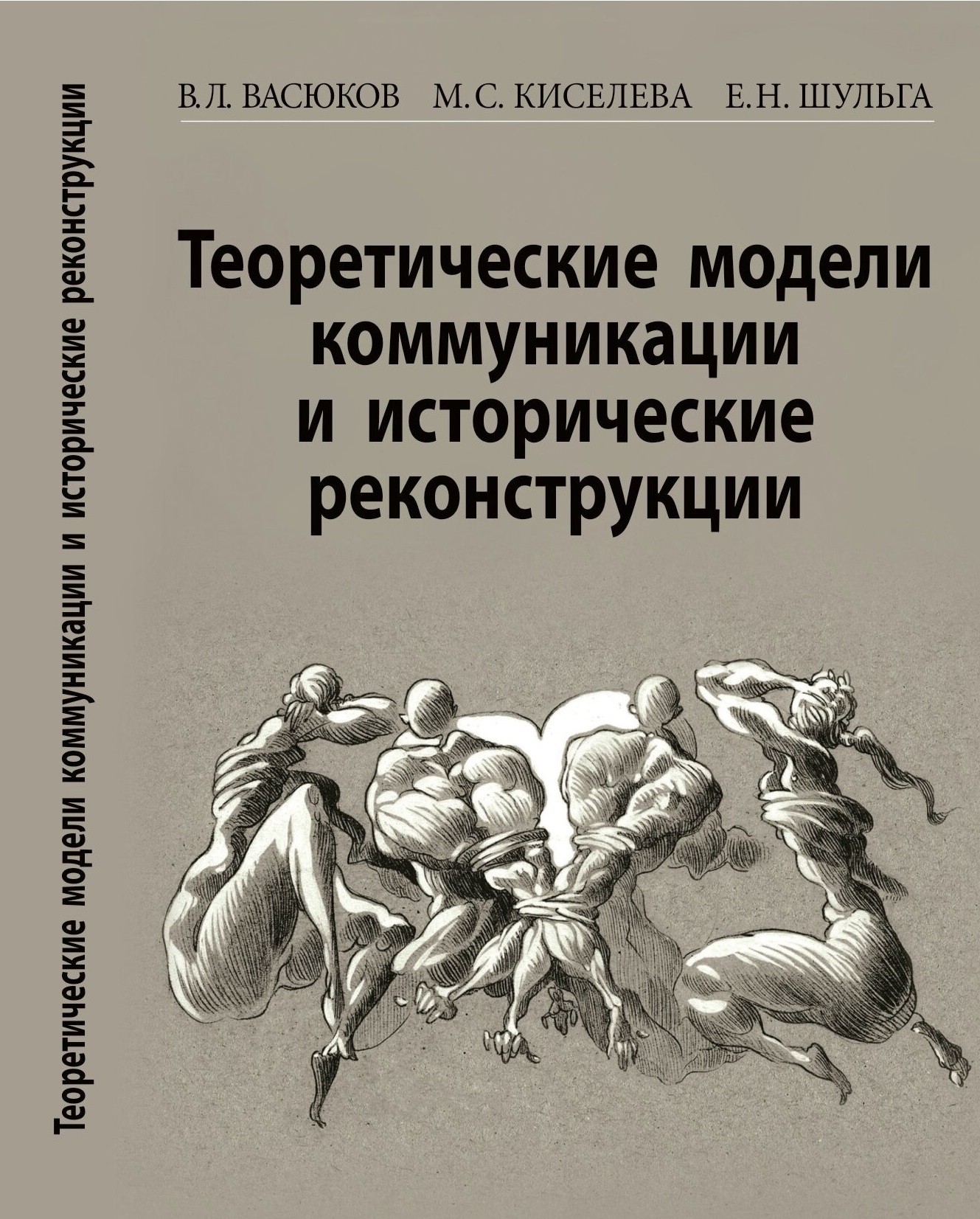Department of Methodology of the Interdisciplinary Study of Man
(in Russian language)
Collective works
|

|
Theoretical models of communications and historical reconstructions. V.L.Vasyukov, M.S.Kiseleva, E.N.Shulga. In-t philosophy of RAS. M.: Science, 2019. 199 pp. ISBN 978-5-02-040226-3
The cultural context of the study is representative and based on the appeal to the range of European and, in particular, Slavic cultures, connected both by their historical commonality and affinity to the Slavic languages, and by differences. The problem of modern cross-cultural dialogue is discussed as an interdisciplinary and humanitarian one; its historical, cultural, socio-philosophical and epistemological aspects are identified. Man - bearer of cultural meaning - is always representative of «his» culture. He lives in the situation of the «living world», carries in him the universal characteristics of an anthropological phenomenon subject to philosophical analysis. The purpose of the book is to develop the meanings and meanings of cultural interactions based on tolerance strategies that accompany and correct the communication act. The research position in this case involves both an intellectual and a practical component based on knowledge of the situation and an understanding of the communication meanings.
|
|

|
Human choice in the modern world: challenges, opportunities, solutions. Proceedings of the scientific conference on October 27–28, 2015 Institute of Philosophy Russian Academy of Sciences (Moscow) in 3 volumes / Ed. M. Kiseleva. Moscow. 2015.
Volume 1 (288 p.)
The first volume of proceedings of the Conference 'Human choice in the modern world: challenges, opportunities, solutions' deals with various discourses in the humanities dedicated to the human choice, which relates humans to the society and culture. Historico-philosophical, epistemological, cultural, historical, sociological, information and networking, and other aspects of this interdisciplinary research fields has brought together academicians in discussions and round tables to the end of trying to reveal the metaphysical meaning of the choice, to make clear the specific content, intention of search and tension of the situation of choice, to find ways to describe the prospects of a choosing person. Of particular interest for a researcher in humanities is her own professional choice related to modern humanitarian knowledge, epistemological problems of the choice of research strategies and methods, disciplinary and interdisciplinary relationships, the objective and projective in modern humanities.
|
|
Human choice in the modern world: challenges, opportunities, solutions. Proceedings of the scientific conference on October 27–28, 2015 Institute of Philosophy Russian Academy of Sciences (Moscow) in 3 volumes / Ed. M. Kiseleva. Moscow. 2015.
Volume 2 (304 p.)
The second volume presents the papers read within the two sections – Religious aspects of choice and Young people facing choice (the 2nd and the 3rd parts). In connection with the religious choice, authors discuss the formation of confessional identities, relationships of religion and science, the choice of ideological positions of a scientist and many others. The problem of choice of young people in the modern world is explored in theoretical terms, in the practices of education and professional work, in relation to health, family, intergenerational communication of the young, to the problem of anti-social behavior.
|
|
Human choice in the modern world: challenges, opportunities, solutions. Proceedings of the scientific conference on October 27–28, 2015 Institute of Philosophy Russian Academy of Sciences (Moscow) in 3 volumes / Ed. M. Kiseleva. Moscow. 2015.
Volume 3 (256 p.)
The third volume of the materials comprises two sections – Practice of human choice: Bioethics, biomedicine and health and Philosophy and Methodology in the space of decision-making (the 4th and 5th parts). Internet search for 'human choice' gives mainly links to bioethics and medicine, where human choice is a practical problem related to the health of the patient, the need to make the right decision, which is often a matter of saving one's life. The authors discuss problems of the bioethical choice, connection of biomedicine and new technologies, changing of practices of relations of a patient and a doctor, healthy lifestyle, forensics, etc. The natural completion of the whole interdisciplinary conference is the analysis of decision-making, the discussion on what 'good' solutions are supposed to be and through what procedures humans can obtain them in different social practices.
|
 |
Man in the intellectual and spiritual space
Rev. THE Kiseleva. – Moscow: Progress-tradition, 2010. – ISBN 978-5-89826-352-2.
The basis of this book develops the idea that has been worked out by Prof. of Philosophy Vladislav Kelle (21.10.1920-02.08.2010) during the last ten years of his scientific research. The differentiation between branches of culture – the intellectual and the religious or spiritual, its historical development, the conflict or the interconnection – that subjects define the structure of the collected articles of Kelle’s colleagues. The articles are devoted to problems of the social philosophy and philosophy of culture. Especially is considered the modern knowledge (high tech, for example) that examined Kelle in the relation to its possible use in modern Russia. Each new subject of the book is introduced by Kelle’s article. In addition there are included in the study the memorial materials and the historical documents about the life of Philosopher Vladislav Kelle. It allows speaking of this book as about the connection of a modern side of scientific knowledge and its recent history.
|
Individual works
|
|
 |
Igor F. Mikhailov Man, mind and networks. Moscow: Russian Academy of Sciences Institute of Philosophy. 2015. 196 p.
The book deals with the philosophical understanding of man as a thinking and free-acting being, as well as with the issues of artificial intelligence, communication and social networking. The author also turns to to the philosophy of mind and the theory of the network society. The book says of interesting facts of the history and theory of network communities. All these subjects are arranged into a coherent picture based on the author's original conception, which is open to discussion.
|
 |
Granin Y.D. Globalization, nations and nationalism. History and present. Experience of social and philosophical research. М: Mediaindustry. 2013 . - 282 p. ISBN 978-5-906310-01-09
In book are analyzed evolution of the concepts "globalization", "nation" and "nationalism" in the history of the European philosophy and science of XVIII-XX of centuries is investigated, are analyzed modern concepts of an origin and evolution of globalization, the nations, the national states and nationalism, their methodological advantages and shortcomings are estimated. The new treatment of the concepts "globalization" and "nationalism" is offered.
|
|

|
Elena Yaroslavtseva
Man, Nature, Society - Subjects of Communicative Ontology. Monograph. - Published by LAP LAMBERT Academic Publishing. 2012 - 540 p.
(ISBN: 978-3-659-17611-1)
The work deals with the issue which was introduced more than 20 years ago and its investigation still continues nowadays. The author considers communicative processes as ontological relations between Man and the world, shaping their interactive environment. Filling the communicative space with feedback relations allows to fulfill the humanitarian approach to the problem at a new level, to carry out a humanitarian expertise of the use of digital technologies, network communication, robotics and 3D visual technologies to find out the risks of the personality development.
|
 |
Kuvshinov S.V., Yaroslavtseva E.I.
Network perspectives. Capability of man in the digital world. Human IT: collective monograph /S.V.Kuvshinov, E.I.Yaroslavtseva. – MO, Shelkovo: Ontoprint. (Publisher is Marhotin P.U), 2011 – 218 p. with illustrations.
(ISBN 978-5-904456-67-2)
Collective monograph “Network perspectives. Capability of man in the digital world” is bestowed to review new aspects of human
development in a world of digital communications, which rapidly change perspectives of social development, specifics of scientific knowledge’s development, and very important field - education.
Humanitarian approach in context of communicative ontology allowed seeing a role of man in the system of relationship with the nature and knowledge acquisition, to carry complex presentation of today’s educational issues. It enabled us to look over social-cultural aspects of changes in educational communications, and also elicit the potential of new digital and network multimedia technologies, introduced on the national and international exhibitions. The important question is analyzed: how new communicative models of social partnership are being created. These models are necessary for organization of investment attraction of education, increasing the value of intellectual ability of young generation, obtainment of stable results of national development.
The edition is aligned to anyone interested in modern theoretical approaches and study manuals made on the base of the newest
technologies, which allow to work in the area of interactive communications and innovative methods of modern Russian education.
|
|

|
Yaroslavtseva Elena
Y76 Man in modern network paradigm: monograph. / Elena Yaroslavtseva. – Moscow, “Kanon+” ROOI “Reabilitation”, 2011. – 532 p.
ISBN
978-5-88373-081-7
Fast developing digital computer communications, web-nets of people relationships, causing new questions to fundamental studies, at the same time create supporting points and potencies of development of modern scientific knowledge. Synergetic approach can form essentially innovative methods of resolving of many interdisciplinary issues, putting special paradigm of research, enabling us to look at the role of a man in this complex growing relations. The book is concerned with intercontinual
communications of a man and the nature, nets of self-organizing correlations’ characteristics. That approach lets us deeper understand the nonlinearity of complex systems’ dynamic, and also interactive role of man, development of his resource potencies, which appears especially bright in education. In Appendix to monograph placed: Educational module and Integrated research project “Interactive plus”. The book is supplemented by Author’s articles, expounding the theme of monograph’s research.
|
|

|
Andreev I.L.
TamTam calls the dedicated. – Moscow: Progress-tradition. 2008. – 384 p. – ISBN 5-89826-279-2.
Essays by I. Andreev, a well-known philosopher, ethnologist and psychologist are based on the author's long-term work in 15 African countries.THE author's focus is on the interrelation of space-time representations with the genesis of property and power, community and tribal institutions of direct democracy, the activities of secret ritual societies, the role of money in the psychology of Africans, the relationship between gender and generations in African society, the specifics of people's pedagogy, the relationship of traditional cults with world religions, difficulties in adapting africans in other countries, and their attitudes toward foreigners at home. The author’s approach will allow the reader to understand more deeply the logic of African thinking and behavior that is different from European standards. The book is written in the genre of a philosophical essay and is equipped with a rich visual range, including photographs collected and made by the author himself.
|
 |
Granin Y.D.
Ethnoses, national state and formation of the Russian nation. Experience of philosophical and methodological research. M: Institute of philosophy Russian Academy of Sciences. 2007 . – 167 p. ISBN 978-5-9540-0071-9
In book are analyzed evolution of the concepts "ethnos" and "nation" in the history of the European philosophy and science of XVII-of the beginning of the XX centuries is investigated, come to light the philosophical bases and research paradigms of concepts of an origin competing in social sciences and evolution of ethnoses, the nations and the national states, their methodological advantages and shortcomings are estimated. Historical forms of "the national states", national integration and a way of formation of the nations in the Western, Central and Eastern Europe are analyzed. The package of measures for formation of the Russian nation as civil and cultural community and improvement of the Russian federalism on the basis of the "nation state" concept is offered.
|
 |
Marina Kiseleva. The Intellectual Choice of Russia in the Late 17th - Early 18th Centuries. Moscow, 2011.
How did the reforms of Peter the Great in the sphere of education and science become possible and had there been grounds for them in Russian culture? The author believes that the intellectual choice was made by Tsar Aleksey Mikhaylovich who invited to Moscow orthodox scholars (scribes) educated according to Western scholastic model in the Kievo-Mogilyanskaya Academy. Intellectuals appeared in the monasteries of Moscow in the late 17th century and brought with them examples of literary Baroque culture. Russia also assimilated Baroque due to Patriarch Nikon who undertook the construction of monasteries on a large scale which resulted траниwith time in the formation of a proper Moscow style, the ‘Naryshkin Baroque’. Sermons and catechisms, opening schools, court ceremonies and theatre, poems, languages studied at school (Greek, Latin, Polish) – all these innovations resulted in the formation of a system of education and rationality so that the state became interested in the enlightenment of the country. In this research is examined the moral theology of Simeon Polotsky in two books of his sermons, ‘Obed dushevny’ and ‘Vecherya duchevnaya’ as well as some texts of Karion Istomin, Theophan Prokopovich and Stephan Yavorsky who created the ideological base for the intellectual efforts of the reforms of Peter the Great, the reforms relating the Moscow Rus’ with the building Russian Empire. |
|



